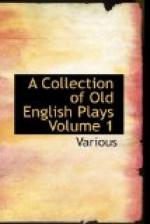Io. A Riddle for my life, some antick Iest? Did I not tell ye what his cunning was?
Asca. I love a Boy?
Ara. Mine art doth tell me so.
Asca. Adde not a fresh increase vnto my woe.
Ara. I dare avouch, what lately I have saide, The love that troubles you is for no maide.
Asca. As well I might be said to touch
the skie,
Or darke the horizon with tapestrie,
Or walke upon the waters of the sea,
As to be haunted with such lunacie.
Ara. If it be false mine Art I will defie.
Asca. Amazed with grief my love is then transform’d.
Io. Maister, be contented; this is leape yeare: Women weare breetches, petticoats are deare; And thats his meaning, on my life it is.
Asca. Oh God, and shal my torments never cease?
Ara. Represse the fury of your troubled minde; Walke here a while, your Lady you may finde.
Io. A Lady and a Boy, this hangs wel together, Like snow in harvest, sun-shine and foule weather.
Enter Eurymine singing.
Eu. Since[121] hope of helpe my froward
starres denie,
Come, sweetest
death, and end my miserie;
He left his countrie,
I my shape have lost;
Deare is the love
that hath so dearly cost.
Yet can I boast, though Phoebus were uniust,
This shift did serve to barre him from his lust.
But who are these alone? I cannot chuse
But blush for shame that anyone should see
Eurymine in this disguise to bee.
Asca. It is (is’t[122] not?) my love Eurymine.
Eury. Hark, some one hallows: gentlemen,
adieu;
In this attire I dare not stay their view.
[Exit.
Asca. My love, my ioy, my life!
By eye, by face, by tongue it should be shee:
Oh I, it was my love; Ile after her,
And though she passe the eagle in her flight
Ile never rest till I have gain’d her sight.
[Exit.
Ara. Love carries him and so retains his
minde
That he forgets how I am left behind.
Yet will I follow softly, as I can,
In hope to see the fortune of the man.
[Exit.
Io. Nay let them go, a Gods name, one
by one;
With all my heart I am glad to be alone.
Here’s old[123] transforming! would with all
his art
He could transform this tree into a tart:
See then if I would flinch from hence or no;
But, for it is not so, I needs must go.
[Exit.
Enter Silvio and Gemulo.
Sil. Is it a bargaine Gemulo or not?
Ge. Thou never knew’st me breake my word, I wot, Nor will I now, betide me bale or blis.




